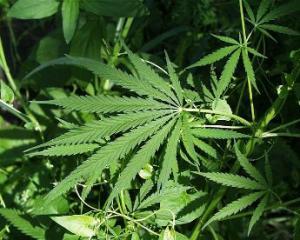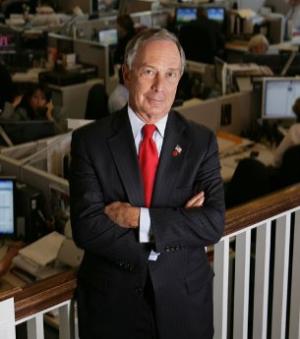Drug War Issues
Politics & Advocacy
The New York City Police Department arrested nearly 140 people a day for low-level marijuana possession offenses in 2010, according to recently released figures from the New York Division of Criminal Justice. Arrests totaled 50,383 last year, accounting for more than 6% of all small-time pot busts nationwide.

NYPD's highest law enforcement priority? (image via Wikimedia)
The dramatic increase in arrests comes even as marijuana usage rates have declined from the 1980 peak, according to US government data. The arrests suggest that the NYPD has quietly made small-time pot busts its top law enforcement priority.
Although the Drug Policy Alliance (DPA) put out a press release with the numbers a week ago, and the story received some play in New York City media, neither Mayor Bloomberg nor the NYPD have deigned to comment.
"New York has made more marijuana arrests under Bloomberg than any mayor in New York City history," said Dr. Harry Levine, a sociology professor at Queens College and a leading scholar of marijuana arrest patterns. "Bloomberg's police have arrested more people for marijuana than Mayors Koch, Dinkins, and Giuliani combined. These arrests cost tens of millions of dollars every year, and introduce tens of thousands of young people into our broken criminal justice system."
The high marijuana possession arrest numbers are particularly shocking because New York state decriminalized marijuana possession back in the 1977. What typically happens is that someone is stopped by the NYPD -- they stopped 575,000 people in 2009 and frisked more than 325,000 of them -- and the police demand that they empty their pockets. When they comply, and a bag of weed emerges, they are then charged not with simple marijuana possession, which is a violation under state law, but with possession "in public view," which is a misdemeanor.
In a stop and frisk, police are allowed to pat down a person to determine whether they are carrying a weapon, but they are not allowed to search inside pockets or bags without probable cause. By complying with a police officer's command to "empty your pockets," the subject is effectively consenting to a search. The better course of action is to say, "Officer, I'm sorry, but I do not consent to any searches." Then, if the officer does search without consent, he could only charge the subject with the violation -- not the misdemeanor "in public view" possession -- and such a charge could be challenged in court.
"Police will intimidate people to get them to take the marijuana out of their pockets, then, once it's in public view, it's an arrestable offense," said the New York native Noah Mamber, of the Marijuana Policy Project. "It's not fair."
Although these offenders are typically sentenced only to a fine, the city gets its pound of flesh first. People busted for pot possession are handcuffed, taken to a police station, booked, and held in jail for 24 hours or more before being arraigned.
The NYPD's "stop and frisk and bust" policy appears to be aimed disproportionately at the city's minority residents and its youth. A whopping 86% of those arrested were black or Latino, even though research consistently shows that young whites use at a higher rate, and 70% of those arrested were under the age of 30.

Mayor Bloomberg could act to stop these busts.
"The NYPD's marijuana enforcement practices are racially biased, unjust, and costly," said Gabriel Sayegh, DPA's New York state director. "The mayor can end these arrests immediately by simply ordering Police Commissioner Ray Kelly and the NYPD to follow the legislative intent of the 1977 decriminalization law. What the Legislature found in 1977 holds true today: Arrests for small amounts of marijuana are inappropriate and wasteful."
"There is no sane reason New York City should have a higher per capita marijuana possession arrest rate than South Carolina or Georgia or Oklahoma," said Allen St. Pierre, executive director of the National Organization for the Reform of Marijuana Laws. (NORML). "The really vexing part is that the numbers have gone up when they should be going down and that they racial disparity numbers are still at about nine to one. This really seems to belie New York City otherwise progressive attitudes on social issues. Ironically, it's safer to be a cannabis consumer in Buffalo or Schenectady than in Greenwich Village, because police in those cities respect the intent of the law."
The policy is really "a left-handed jobs program for New York City police," St. Pierre continued. "Police in the city can't negotiate increased wages and salaries, but they seem to have an agreement with the mayor's office that they can achieve pay increases by arresting cannabis consumers and then getting overtime. Harry Levine calls it 'dollars for collars.'"
"This is nothing surprising," sighed Morgan Fox, MPP director of communications. "New York City has been an epicenter of marijuana arrests for years, and the racial disparities are no surprise either.
New York City needs to change its low-down ways, said Fox. "They either need to amend the law so it is completely and truly decriminalized, or they could just tax and regulate it similar to alcohol," he argued.
DPA and the IJJRA are working on it on a couple of different levels. The two groups have launched a training program called "Know Your Rights, Build Your Future," which will hold training sessions across the city to educate New Yorkers about their rights and the law. They are also calling on the city council to hold hearings to learn more about the human and fiscal costs of the arrests and to demand greater accountability from the NYPD.
In the mean time, New York City pot smokers need to watch out -- especially if they're young, non-white, or in the outer boroughs. And they would be well-served to educate themselves about what their rights are and how to effectively exercise them.
This work by StoptheDrugWar.org is licensed under Creative Commons Attribution-ShareAlike 4.0 International
Comments
If they (whoever could pay
If they (whoever could pay for it) could put up a few signs in the areas where most of the arrests are being made, that said something like "did you know? new york decriminalized possession of marijuana in 1977. It is still decriminalized today. yet nyc is the marijuana arrest capital of america."
I know it would probably be too expensive, but we can dream can't we? It would go a long way, not just to stop the abuses of the police, but to raise the debate in the city and even in the state.
And in fact, while i'm on the topic, I just want to say that we (the reform community) should look for a way to target poor neighborhoods about this debate. Not that we haven't or aren't doing it already, but if we can do more we should, for two reasons: 1) they are the most affected by the drug war and 2) they overall have less access to the internet than the rest of the country.
If we could get debate going in the heart of where the drug war affects people the most, it would change things.
Why no class action against NYC by reform orgs???
One thing I don't get about this problem is why it hasn't been stopped.
It's pretty clear that police are not acting legally and in good faith when they stop and frisk a subject and then pull out a small amount of marijuana from a pocket or backpack and then arrest the subject for marijuana in "plain (public) view". Of course, the charges get thrown out -- typically after an overnight stay in a holding cell. Street justice, plus the police get valuable fingerprints and another person "in the (computer) system" and typically four hours of overtime processing each arrest.
Oh, as for those talking about "decriminalization", this is decriminalization. New York State decriminalized small amounts of marijuana (< 7/8 ounce) and made it a non-arrestable violation with a $100 ticket fine in 1977, precisely to avoid the kind of dragnet conducted in NYC.
Multiply this times hundreds per week, year in and year out, mayor after mayor.
When does this stop? I'm not pointing fingers at any of the fine civil rights and drug policy orgs that know about this problem and have highlighted it and rallied against it (ACLU, DPA), but I'm quite frankly puzzled as to why there has been no class action lawsuit generically ruling that you can't falsely arrest people for this "plain view" violation where it came about because of a non-consensual "stop and frisk", even if someone voluntarily emptied his pockets. It happens tens of thousands of times a year in NYC, and the problem's getting worse, not better, it seems.
If "stop and frisk" is about weapons, and making the city safer, and the police aren't smart enough to want to build trust in the minority communities but would rather pad their arrest quotas and get overtime for booking by this marijuana stunt, the Courts ought to intervene and make them do it.
Injustice Defined
As far as I'm concerned, marijuana prohibition has been the greatest civil injustice in Americas history behind slavery. It's illegal for all the wrong reasons. The government makes money from both ends of the shitty stick. They import and sell it, and then lock people up and take their homes when they do the same. If there is such a thing as evil, it is in government. Marijuana is the cure for cancer (youtube = run from the cure). It's a healthy alternative to alcohol, and a far better crop than cotton. There's just so many different agendas that it does not fit in to. All of which boil down to greed and control, even population control. When I step out of the box, and think about it all, I can come up with no other word to describe the United States Governments stance on marijuana, EVIL. No other word fits the bill...
Add new comment